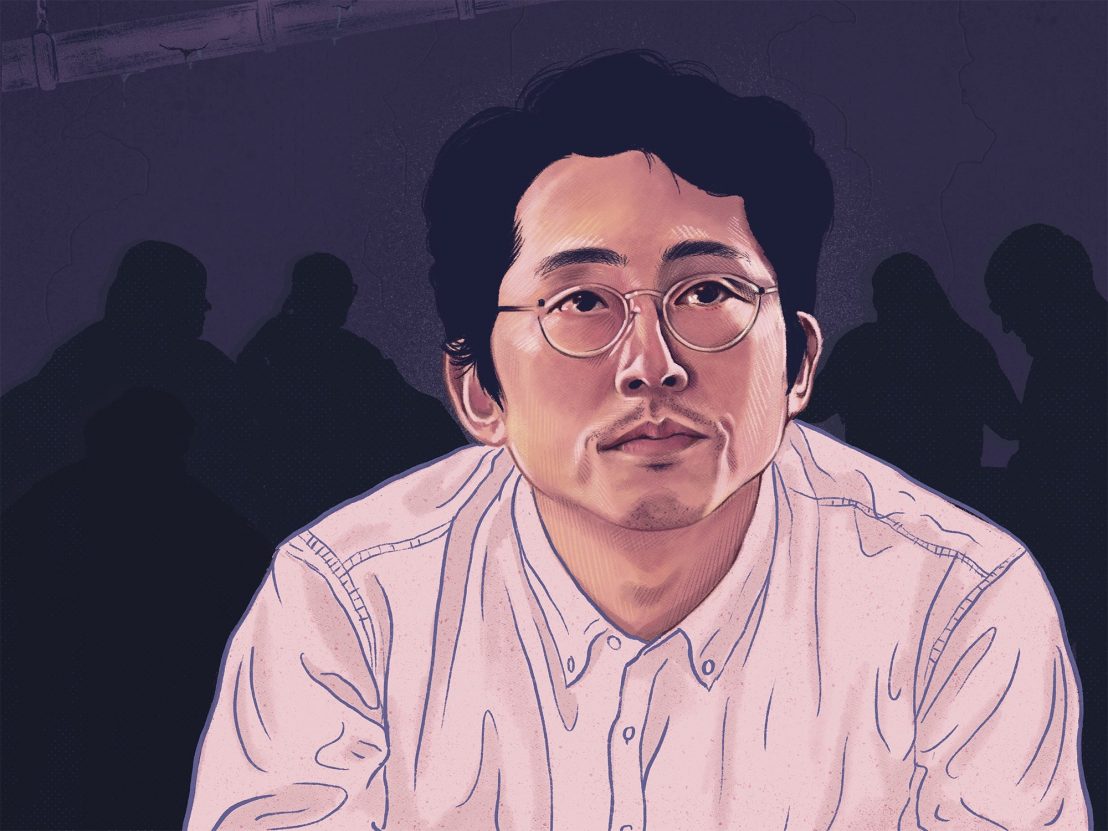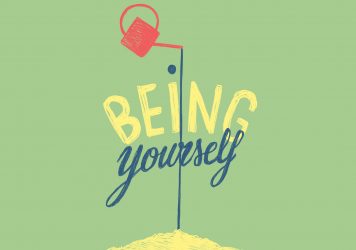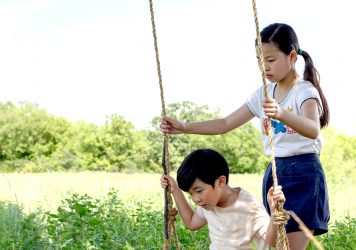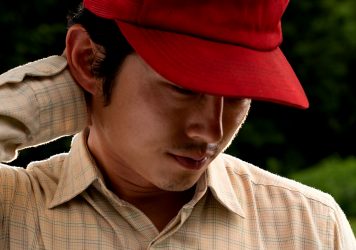
The in-demand Korean-American actor reflects on his role in Stephen Karam’s intimate ensemble drama The Humans.
LWLies: You lived in Korea and then Canada before coming to the States. What were your first Thanksgivings like?
Yeun: I just remember my aunt’s house in Grosse Isle. They were the most well-off in our family by leaps and bounds at the time, and they’d become this central hub for a lot of family members to run through. We were there, my cousins, my other cousins, my grandma would come, and I remember their dining room filled with both American Thanksgiving food and Korean food. I think a lot of Korean-American families have a Korean Thanksgiving like this. And it was delicious, so that’s mostly what I remember. Deliciousness, watching Friends, and getting beat up by my cousins. Normal shit.
You grew up in a Christian family. What do you make of the religious aspect of this film?
The title says it all: it’s about being human. It’s about the constructs we attach ourselves to in order to not feel like we’re floating in chaos. It’s about isolation and connection, wanting to be loved but not knowing the language of how to do that or receive it. It’s about separate people’s realities clashing with each other. It’s about expectations about projections. It’s the full Thanksgiving dinner, coming home with your own interior life and then being force to come back to a function and a role in this other life, and the frustrations with that.
You got your start on stage doing sketch comedy. Did you feel like doing an adaptation of this play brought you back to that?
It really did. Because not only was the process really theatre-based, with seven or eight days of rehearsals and deconstruction together, the way the set was arranged really felt like a theatrical stage. It was an apartment built in a soundstage in Brooklyn, with movable walls that would give you escapes and ways to leave that weren’t really traditional exits. You’re in a play, so you’ve got to cheat around the camera to be where you need to be to deliver your next line. The blocking was complex, but it wasn’t fixed. We were supposed to float in the space and just live it, because the camera wasn’t on a fixed point either. You sometimes have to slide around this giant machine in an awkward way. But the immersion could be really trippy. It still felt like a play.
In the original production, your role was played by Arian Moayed. How did you interpret the significance of your character being the only nonwhite person at this dinner?
What’s cool about this role is that [Stephen Karam] doesn’t flatten this role to be an extension of the family. He’s got his own life. Whoever the actor is that’s playing this role has to bring his own truth to it. The original actor who was cast, he was representing – maybe purposefully, maybe not – the tensions of 9/11. What’s been cool is hearing about this, especially from Jayne Houdyshell’s perspective, having been with this the whole time from stage to film, she’s said that people’s reception of the story has mutated over time. At first it was about 9/11, then it was about Trump, now it feels maybe pandemic-y – or East-meets-West with my being in the cast. We can play in this what-is-it-about tier, but it comes down to people’s humanity.
How did you and Beanie Feldstein map out the relationship between your characters, and figure out what kind of life you’d have together?
We talked about physical commonalities. Everyone’s trying to search for a specific kind of life, they’re all adults, they’re trying to feel older than they. And Richard is older, but why? Why’s he with a younger woman, and what’s that do for her? Is it that she feels more cultured and mature, as someone who’s been the baby of the family the whole time? I thought my character might also be the youngest of the family or maybe an only child, and he likes feeling like an adult, so he’s with someone younger. We held some of that stuff to ourselves, too. it felt very real.
When you were younger, what was the worst apartment you had?
Oh, it was pretty bad. I lived in a rear coach house as my first apartment, so there was barely any light. I lived in an upstairs crevice that had been split into two bedrooms, so I had a room and my friend had a room. But the ceiling was vaulted, so if you went to one side of the room, you couldn’t stand. Luckily, the Midwest isn’t as expensive as New York.
“I’d love to work with Park Chan-wook, I’ve just never gotten that call.”
With your character being at an uncomfortable dinner gathering, reluctantly accepting a gift, there’s a similarity to your sketch from I Think You Should Leave.
The receipt! I’ve heard that a couple times. That sketch has really had a life of its own. I love Tim Robinson, knew him from doing Second City. Tim and Sam Richardson are my heroes. But I wonder, what is it about that sketch that gets people?
There are these minute social codes which we’re expected to follow, and that sketch imagines what it would be like if we didn’t have to.
Like on Curb Your Enthusiasm! He gets to complain about all the shit we wish we could. But I love the new season of I Think You Should Leave, I love the rubber suit guy. ‘I don’t feel good! There’s too much shit on me!’ Tim’s a genius, man.
Over the past five years, you’ve worked with Bong Joon-ho and Lee Chang-dong; as titans of Korean cinema go, have you ever met Park Chan-wook?
I have, yeah! I’d love to work with him, I’ve just never gotten that call. I met him the same year I met director Bong, which was very lucky; a friend acquainted us all while I was still on Walking Dead. I remember taking a stroll around the streets with him, Park walking with his hands clasped behind his back. I do that myself now. He took me to eat Pyongyang noodles – Naengmyeon, this really delicious dish – and that was the last time I saw him before the premiere of The Handmaiden in Korea, which was a great experience. Getting to watch something so intense with him and his wife sitting behind me, that was really wild.
When doing a tight-knit ensemble piece like this, is there a tragic sense to the way you form an intimate family while working only for it to break apart?
I don’t know how to articulate it, because this might not be what people expect, but I find a comfort in leaving it all on the court. All the people involved here and in other projects I’ve done, there’s always an awareness that you might not see someone for a while, but you’ll know them forever. I haven’t seen a lot of my friends from Walking Dead in a minute, but I know we’ve still got it. Acting is a weird business. It’s a strange task. It can cost you, but it doesn’t have to. There’s a method of protecting yourself from that cost.
The Korean film industry has a greater presence in America than ever; have you found that this is a ‘rising tide lifts all boats’ situation? Are there more opportunities and interest in Korean-American stories?
There are a lot of things happening at the same time. One danger of that is that Korean-American, or third culture stories in general, those are largely being gentrified because of the power of the nation-state itself. When America ingests Korean cinema and applies that to things that exist in America, it flattens them. The conundrum is that a lot of Asian-Americans are put in this weird binary where to gain access and make their stories, they need to co-opt the power of the industry. You’re gentrifying yourself, to some degree. There’s a push and pull about it. I’ve been trying float in this space of not necessarily identifying with oriental, occidental, East-West Korea-America. I’m trying to get to – what I deem as truly global – is humanity.
As obvious and literal as that is, that’s what drew me to this project, the desire to play a humanity we can all access. Culture and boundaries, regions and ethnicities, these are beautiful but they’re also constructions. There was an expression going around Hollywood for a while, that ‘specificity is universality’. And that’s true, I get what you’re saying, but I didn’t like that adage. I always wanted to say, ‘Who’s asking for more specific?’ The people asking are usually powerful executives representing the majority, asking a minority person to give them something more relatable and easily understood. It shouldn’t be that specificity is universality, but that humanity is universality. Personality. Can we remove all these structures and get to the thing, and maybe then start putting them back? That’s a difficult needle to thread.
The Humans is released in cinemas 31 December. Read the LWLies Recommends review.
Published 21 Dec 2021

The writer/director and on-screen father-son tell the story of how they captured cinematic lightning in a bottle.

This gorgeous semi-memoir filters the ragged glory of the American Dream through a family of South Korean immigrant farmers.

From The Walking Dead to Minari, we chart the amazing journey of this Oscar-nominated star.